Keeping a clean home isn't about lists, schedules, or expensive planners! It's all about the daily habits that result in a clean and tidy home. Today I'm sharing with you the best habits I've learned to build on over my years as a homemaker.

This post contains affiliate links, which means that if you click a link and make a purchase, we receive a commission at no additional cost to you. See our disclaimer for more information. Any nutritional information is for entertainment and informational purposes only, and is not intended as medical advice. Always seek the advice of your health provider.
Before I established good habits, I found myself spending hours and hours cleaning each day. Eventually I realized that I could cut my cleaning time in half if I implemented positive habits. Over time, those habits stuck and now cleaning is so much easier. Today I'm going to share how those habits help me keep a clean home...and how you can do the same!
Embrace That Some Things Will Never Be Done
This isn't so much a habit as it is just general advice, which will help you establish your habits with the right perspective. It can be extremely frustrating to finally "catch up" on laundry, only to see the hamper is full again just a few hours later. It can be tempting to be resentful of laundry, or put it off because it never stays done anyway, but that isn't going to help you develop good habits. When I finally acknowledged and accepted that certain chores (like dishes and laundry) would never be "done", I was able to find joy in performing my duty rather than irritation that it was never truly completed. I wake up every day knowing one thing for sure: I will be doing dishes, and I will be doing laundry. Accept it, do it, and move on.
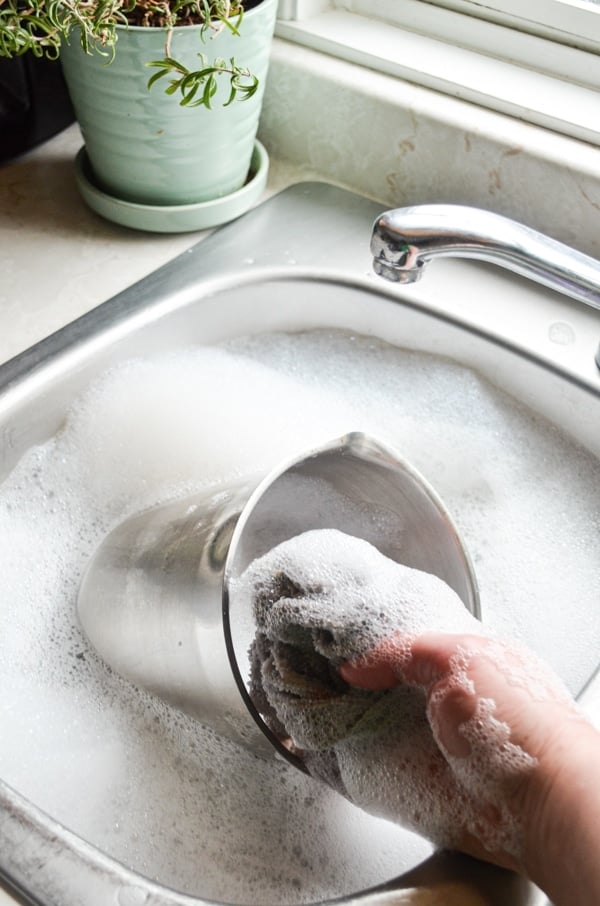
Dishes After Every Meal
Since keeping up with the dishes is a never-ending battle, I've developed some systems that help me keep them at bay. Since we cook from scratch, 3 times a day, and almost always at home, there are a lot of dishes to be done. On top of testing and photographing recipes for my blog, it can get pretty messy in my kitchen if I don't keep on top of it. The best system I've developed for dishes is to do them after every single meal. This can be done with or without a dishwasher.
The idea is that you make sure your dishes are completed after every meal. Once breakfast is complete, I wash up any pots or skillets I used, plus any other dishes accumulated since the night before. Not only does this habit help me keep up on dishes, it makes washing my pots and pans so much easier because I'm washing them before they have a chance to get all hard and crusty!
This is a great post from Living on a Dime all about efficiently washing dishes by hand.
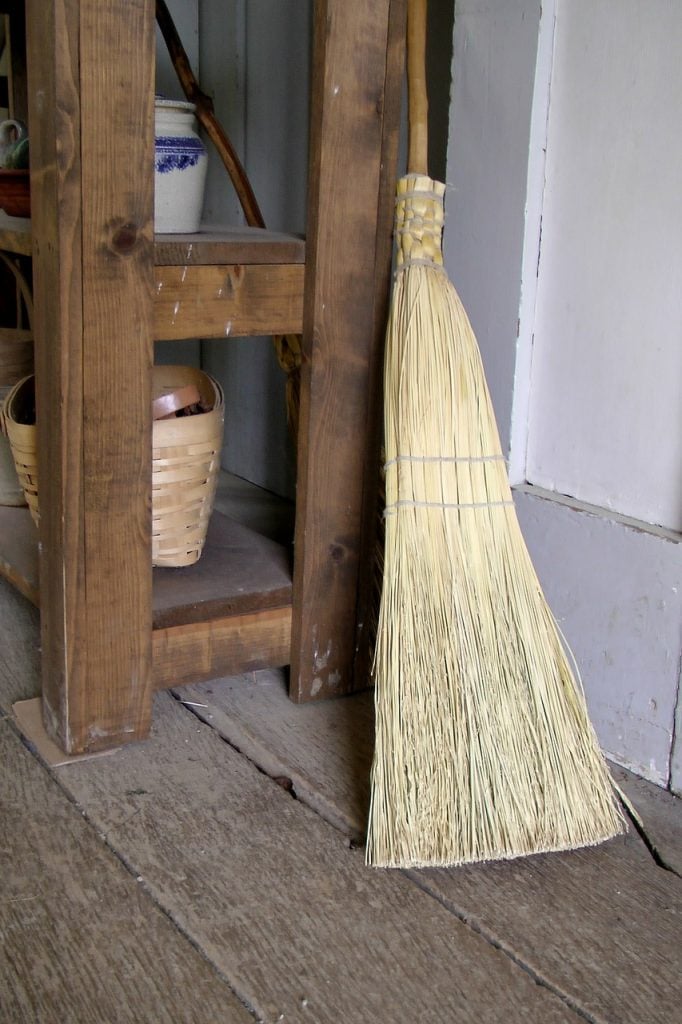
Wipe Down, Sweep Up
We've all experienced what I call "granola floors." You know what I'm talking about! When you've let your sweeping go too long and there are all kinds of bits of nuts, oats, flour, etc littering your floor and clinging to your bare feet. Some days (like baking days) are worse than others, but a great way to combat that is by wiping down and sweeping after every single meal. Sensing a trend here?
Since most mess is made in the preparation and consumption of meals, it only makes sense to make sweeping up a part of your post-meal clean up routine. Wiping down the counters and kitchen table with a wet cloth, and then sweeping up the crumbs takes less than 5 minutes, but will help you keep your floors "granola free". Sweeping up often also means you won't have to mop or vacuum as often. Dealing with the mess when it is new means stains and crumbs don't have a chance to settle.
Adapting Habits for Your Home
I really just wipe down and sweep up my kitchen, but if you have rooms in your home that can get crunchy, make sure you include them as part of your daily routine. Make sure you adapt any of these clean home habits so they work for you in your particular situation!

Making Your Bed
I never thought I would be the kind of person that made my bed every day. Tidiness, like everything else, is a learned skill that comes with practice. Sure, there are people that are born a little more tidy than others. For the most part though, it is about building habits and skill. Such has been the case for me at least.
When I first moved out on my own, I didn't even use sheets, let alone make my bed! I was extremely slobby and slovenly, but I learned over time the skills needed to keep a home. When we had our first apartment, it became my joy to learn all kinds of old fashioned homemaking skills. I still hadn't developed habits, but I worked hard at learning what it took to keep a home clean. When we bought our little farmhouse cottage in the country, I had an even stronger desire to keep my home tidy and efficient.
At some point over the past decade, I became the girl that makes her bed every day. I realized that it wasn't at all difficult or time consuming to pull up the sheets, shake out and spread the quilt, and fluff the pillows. Maybe a minute, tops. So do it! Time yourself doing some of these chores, and you'll realize how little time it takes to complete these daily habits for a clean home.
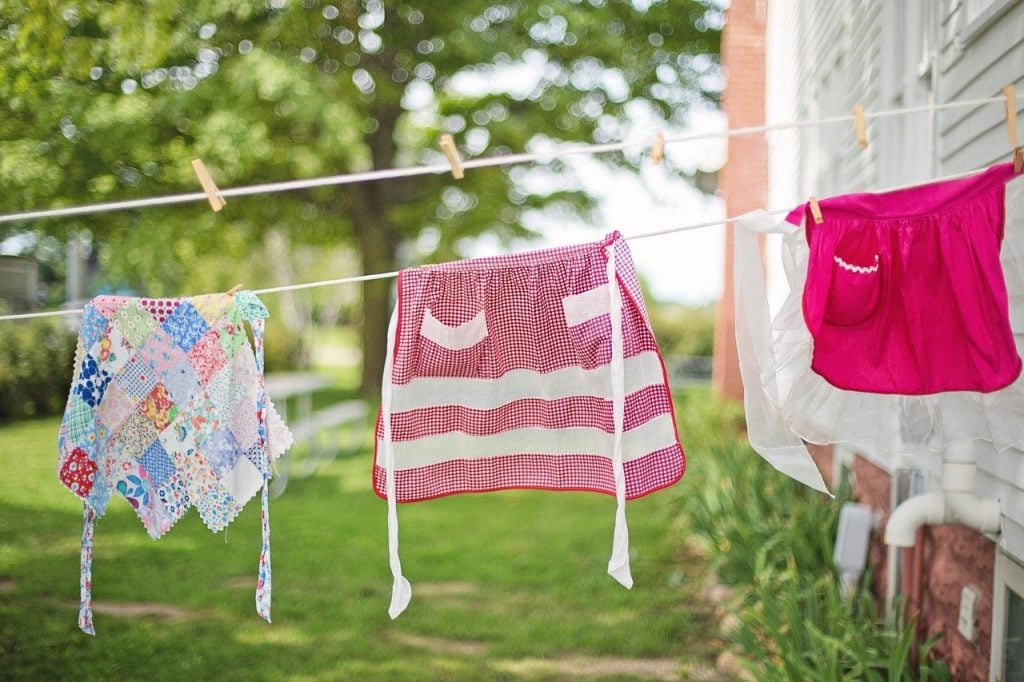
Doing Laundry Every Day
In days past, homemakers did the laundry once per week. I see this all the time in those retro cleaning schedules. They did the laundry once per week for several reasons:
- They had very few clothes, since clothing was very expensive. Often, they would wear the same dress 6 days per week and use a protective apron to keep that dress clean.
- Laundry was much more involved. If you had to wash laundry by hand with a wash tub, wash board, and hand crank wringer you'd only want to do it once per week too!
- It took ALL day. Laundry was an all day affair. Not only did the laundry washing portion take a great deal of time, so did the hanging out and drying of laundry.
With today's modern appliances, we can get laundry done fairly quickly, and with little hands on work. We also chance twice per day, plus towels and linens. It's so much easier to keep up with your laundry and manage all the folding if you do it every day. Sometimes the dread you feel in folding a gigantic mountain of laundry inhibits you from completing your tasks. There is a mental load that comes with seeing all your work there, just waiting to be done. Doing your laundry, daily, one load at a time, will help you combat this overwhelm and is an essential daily habit for a clean home.
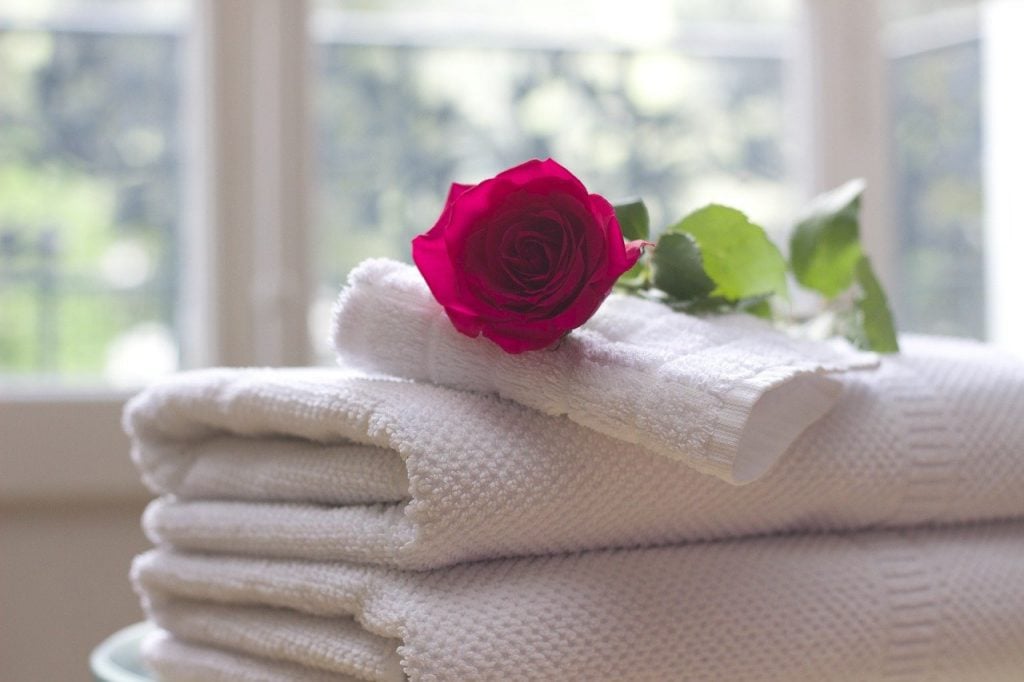
Nothing is Done, Until It's Done
This is one thing that really shifted my perspective as far as cleaning go. It's not done, until it's done. So what does that mean? You know those dishes, hanging out there in the drying rack? I've got some news for you: they're not done. Sure, you washed them, but you will need to come back and put them away. Therefore, they're not done. This is another thing that adds to your subconscious mental load, because you know in the back of your mind that you truly didn't finish the task. That's why I threw my dish rack out and instead bought a drying mat. Complete the task, right then and right there. Dry the dishes, put them away, and be done.
The laundry isn't done, until it's done. So if you leave your daily load in the dryer, you have not completed the laundry. You need to fold it, and put it away. Now it is done. Do you see what I mean? Shift your focus, and complete your tasks all the way through. You won't be running around touching things, you will be moving from task to task, and completing them. Big difference.
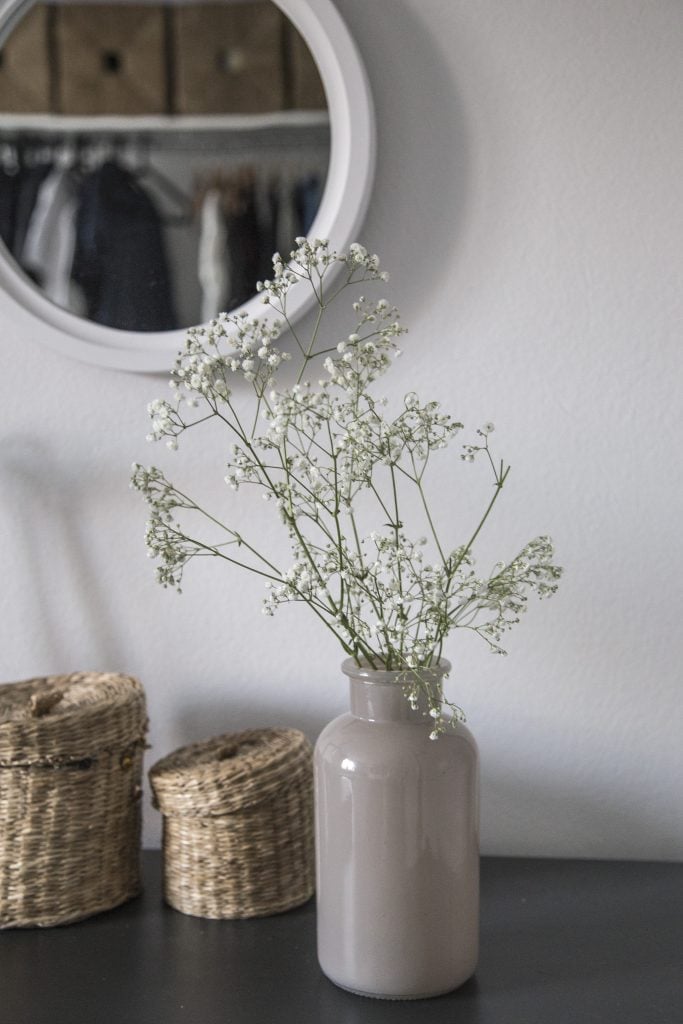
10 Second Tidy
This is kind of a play on a silly segment of The Big Comfy Couch, which was a show I watched when I was a kid. The main character of the show would spend the whole show making a huge mess, and then do a "10 second tidy", which would remedy the situation in mere seconds. While you can't accomplish too much in 10 seconds, the idea is to take a quick minute or so to tidy things up when you are ready to leave the room.
For example, when you get up from the couch and leave the living room for the night, you can:
- Fold the blankets
- Fluff the pillows
- Tidy the remotes
- Turn off the lights
- Pick up toys
- Tuck away any home crafts you were working on
Those are small, seemingly insignificant things, but all these small moments and tasks add up to a tidy home. Building small habits like this mean you are primping and fixing often, but not really doing a whole lot of "cleaning" in the traditional sense.
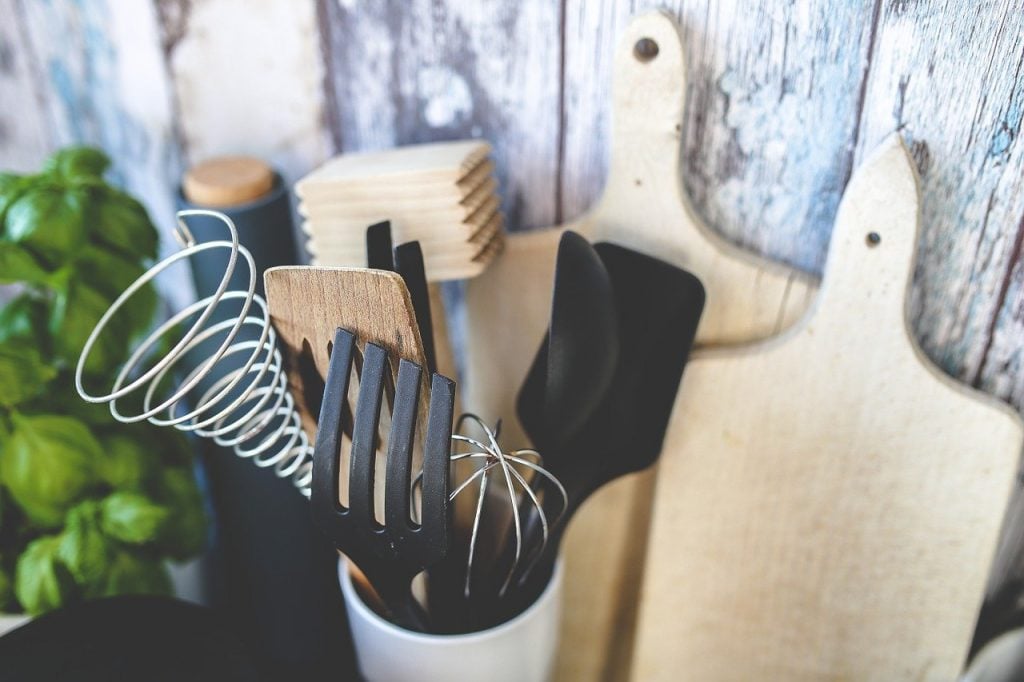
Part of Cooking is Cleaning as You Go
When I was first married, my husband called me "The Cyclone Chef" because I made such a state of the kitchen. I had not yet developed the habit of doing my dishes after every meal. As a result there would be a massive counter full of dishes. I've always been adventurous in the kitchen, so it's not unusual for me to use 3 or 4 pots and pans in the preparation of a single meal. It was bad y'all, BAD!
But I heard someone somewhere along the way: "part of cooking is cleaning as you go" and it clicked for me! Part of the cooking process, is the cleaning process. By getting a sink of hot, soapy water going while I was in the process of cooking, I could dunk those dirty dishes in right away. This made for less scrubbing, and it meant that I would have only a few dishes to finish up after the meal is served.
An Added Bonus
In addition to dishes, part of this means wiping up spills and stains as they happen. I used to leave the spaghetti sauce splats on the oven, thinking "I'll get to it later...", but I wouldn't until a day or so later, and by that point it would be practically baked on. Wiping up the spill when it is fresh means that I don't have to deal with a sticky mess later on. Since you have a sink of hot soapy water, you can just use your dish cloth to wipe up those splats as they come. Make sure to wipe down your cooking surfaces when the meal is finished as well!
Don't Touch it Twice
This has become a maxim of mine, since it applies to so many situations. As far as efficiency goes, it's probably the most helpful tip I can offer. Once you switch your mind set and adapt a "don't touch it twice" policy, you'll find you keep a clean home A LOT more effortlessly.
But what does it mean?
Refusing to touch something twice, means you see the task through the first time. If you bring your dishes out and set them on the counter, you will have to come back a second time and complete the task: wash the dish or put them in the dishwasher. If you complete the task the first time, you don't have to come back the second time to follow through.
Another example is garbage. I've seen plenty of people pick up a piece of garbage and set it on the table next to them. They say they will bring it to the garbage bin later. Pick up the trash and follow it all the way through to the completion of the task: put it in the garbage bin. Don't touch it twice!
This is probably the reason I feel the way I do about dishes. If you leave them to dry, you are having to come back several hours later to complete the task. I would much rather complete the task then and there, getting the clutter off my counter, and ensuring I don't touch it twice.
Some examples of ways you can put this habit into practice:
- Laundry in the hamper
- Hanging up the towels
- Put dishes directly in the dishwasher
- Fold blankets as soon as you're done using them
- Put your shoes away as soon as you take them off
- Hang up your coat as soon as you take it off
- Wipe up stains and spills immediately

Day of Rest
Six days shall work be done, but on the seventh day is a Sabbath of solemn rest, a holy convocation. You shall do no work. It is a Sabbath to the Lord in all your dwelling places.
Leviticus 23:3
God has given us a day of rest in the Sabbath. Because we are all created in the image of God, we all have a need for rest. While work is a good thing, it's important that we prepare for our work with a day of rest. We were not designed to work seven days a week, but rather to rest on the seventh day. If you take an opportunity for rest and refreshment, you will come back to your work with a renewed joy and sense of purpose.
As a Christian, participating in the Sabbath as a day of rest and set aside for worship is important. If you'd like to set the Sabbath aside, prepare for your day of rest. Start by cooking a larger meal on Saturday (for leftovers on Sunday), making use of a dishwasher or paper plates, and leaving what you can for the following morning.
In Conclusion: Habits for a Clean Home
There are so many options for creating a cleaning routine. If you're like me, it can be difficult to stick to such a structured plan. Especially if you have little ones at home, it can be nearly impossible to schedule your day with the level of precision that is required by so many cleaning schedules. Routines, rather than schedules, are going to serve you a lot better. Routines develop out of habits, and habits take time.
Pick one habit, and work on it until it becomes second nature. I often hear it said that it takes 21 days to make something a habit. These are my suggestions, based on my years of full time homemaking. These daily habits have been the biggest game changers for me when it comes to keeping a clean home. I hope they are helpful for you too!
Let me know in the comments below what habits you've built, and how they've helped you keep a clean home! 👇
Make sure to follow me on Instagram (@LittleHomeintheMaking) where I will be doing 7 Days of Habits for a Clean Home based on this post!
One Pot Recipes for Less Mess:



















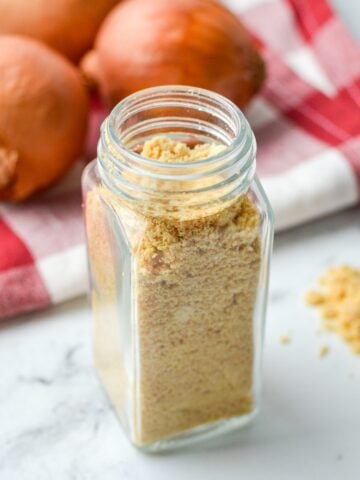

Jane T
My favorite takeaway is "Don't touch it twice". That is great advice.